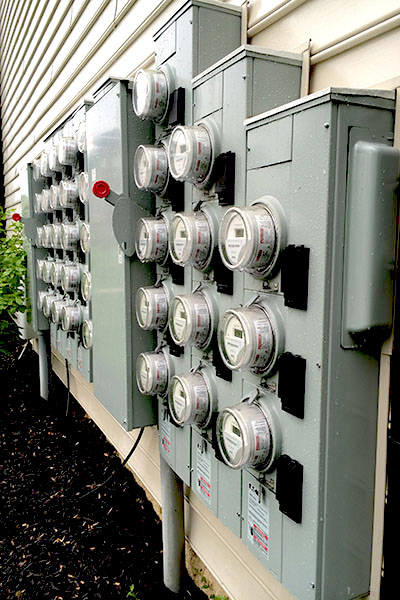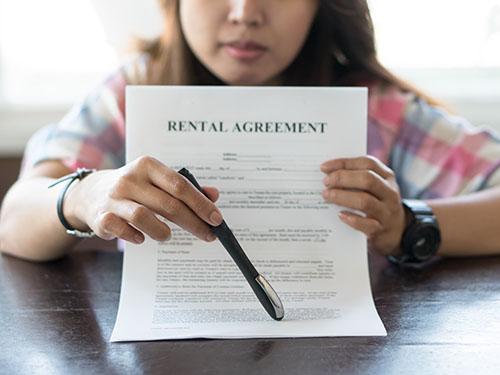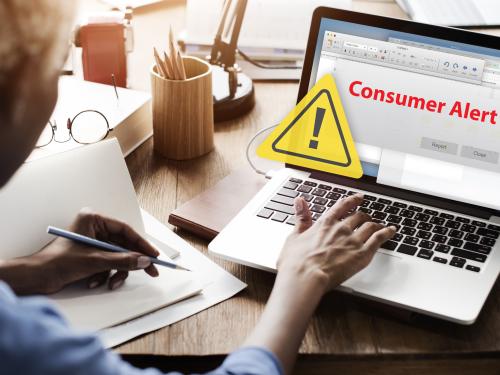Submetering (reselling of utility services) and proposed legislation
CLICK TO VIEW VIDEO – OCC’s Agency Director Maureen Willis was invited to participate in a press conference introducing bipartisan pro-consumer submetering regulation co-sponsored by State Reps. Sean Patrick Brennan (D-Parma) and Tex Fischer (R-Boardman).
The residents of many apartments, manufactured homes and other housing communities in Ohio and other states do not receive a bill from their local utility. Instead, their utility service might be submetered, included in the rent, or pro-rated among others in the community. A submeter allows an apartment owner or other company to purchase utility service (electric and water) and then resell that service to tenants by utilizing the submeter to record usage.
Submetered consumers in Ohio lack the protections that are given to direct customers of regulated utilities, including certain consumer assistance programs, payment plans, and disconnection protections.
In October 2013, an investigation by the Columbus Dispatch discovered that the practice of reselling public utility services has inflated some residential utility bills by as much as 40 percent, compared to customers who are billed directly by a public utility.
Several bills related to the reselling of utility services have been introduced in the Ohio General Assembly. The Office of the Consumers’ Counsel (OCC) continues to work with legislators and other stakeholders to address the concerns associated with the practice of reselling. In testimony before the Ohio House Finance and Appropriations Committee in April 2014, the Consumers’ Counsel provided recommendations to protect consumers from the high costs of resold public utility services.
In March 2019, Senator Tina Maharath (D - District 3) introduced new legislation on submetering, Senate Bill 86. This bill would have provided consumers with some regulatory protections from the reselling of utility services. However, the bill never made it out of committee.
 In May 2023, Senator Andrew O. Brenner (R - District 19) introduced Senate Bill 123. This bill would exempt from regulation as a public utility certain persons or entities providing utility related services after the metered point of delivery.
In May 2023, Senator Andrew O. Brenner (R - District 19) introduced Senate Bill 123. This bill would exempt from regulation as a public utility certain persons or entities providing utility related services after the metered point of delivery.
In August, 2023, Ohio Lawmaker, Representative Latyna Humphrey (D-Columbus) eloquently shared the struggles of submetering consumers in a comment she filed in the PUCO case where AEP opposed NEP taking over service for a number of their customers. Here is a link: https://dis.puc.state.oh.us/DocumentRecord.aspx?DocID=583ff085-565e-4fc8-8452-f8f530dcc5a7:
Here are excerpts from Rep. Humphrey’s letter:
“As a legislator I have watched years pass with no relief delivered to my constituents who are exploited by the practice of submetering. In 2020, the Ohio Supreme Court clearly stated that the Public Utilities Commission of Ohio is best positioned to apply the facts of submetering to the legal standards of public utilities and to issue a decision. I write to urge the PUCO to establish its power to regulate the activities of submetering companies and to protect my constituents from this gap in regulation….
During this time the submetering companies have profited and the consumers have continued to be the losers in this struggle. The PUCO has the ability and the mandate to declare that submetering companies providing public utility services to consumers should be regulated the same as any public utility.”
In October 2023, the Ohio Consumers’ Counsel asked the PUCO to reconsider its recent decision where it ruled that it has no power over Nationwide Energy Partners’ (NEP) resale of electric service to apartment residents. The OCC also asked the PUCO to reverse its ruling denying OCC a voice in the case.
Here are some excerpts from the filing:
“Residential consumers living in the NEP submetered apartments should have the same consumer protections under Ohio law and the PUCO’s rules as residential consumers who receive electric utility service directly from the PUCO-regulated utility, AEP Ohio.” (page 3)
“When residential utility consumers receive electric utility service directly from a PUCO-regulated utility like AEP Ohio, they receive many consumer protections under Ohio law and the PUCO’s rules. These consumer protections include, but are not limited to:
- The PUCO’s regulation of rates and service terms, including periodic audits by the PUCO;
- Being able to use the PUCO’s complaint procedures and call center to seek assistance with service and billing disputes;
- Clear and informative billing information that has been reviewed by stakeholders and approved by the PUCO;
- The ability to take advantage of the PUCO’s percentage of income payment plan program (‘PIPP’); and
- The ability to ‘shop’ for electric supply from marketers if they choose.
The PUCO’s determination that is has no jurisdiction over NEP’s submetering service means that residential consumers will lose these rights regarding their essential electric utility service. The PUCO should grant rehearing to fix this unreasonable and unjust result.” (pages 3-4)
“The PUCO erred by unlawfully denying residential consumers a voice in this proceeding, through their state residential utility advocate (OCC) in violation of R.C. 4903.221, O.A.C. 4901-1-11, and Ohio Supreme Court precedent. The PUCO abused its discretion by refusing to let the Consumers’ Counsel intervene.” (page 7)
- PUCO docket in the case: https://dis.puc.state.oh.us/CaseRecord.aspx?CaseNo=21-990&x=0&y=0
- OCC Application for Rehearing: https://dis.puc.state.oh.us/DocumentRecord.aspx?DocID=02315c5a-d0e2-46d0-b083-fff55c30c201
- OCC’s Motion for Leave to File Application: https://dis.puc.state.oh.us/DocumentRecord.aspx?DocID=6113885a-7880-4295-8a8d-460145a83898
In January 2024, The OCC asked the Ohio Supreme Court to intervene in the case where the PUCO denied protection for the AEP consumers who were switched to Nationwide Energy Partners Submetering and where the PUCO denied OCC a voice in the case. OCC seeks to protect the rights of submetering consumers, maintaining that as customers of a submeterer, they lose “a multitude of rights and protections . . . that ensure consumers receive adequate, safe, and reasonable electric service.”
Here is a link to OCC’s Merit Brief in that case: https://www.supremecourt.ohio.gov/pdf_viewer/pdf_viewer.aspx?pdf=960620.pdf&subdirectory=2024-0029\DocketItems&source=DL_Clerk
Here is a link to the case docket: https://www.supremecourt.ohio.gov/Clerk/ecms/#/caseinfo/2024/0029
In June 2024, OCC filed testimony detailing how AEP consumers would be harmed if forced to become NEP consumers.
https://dis.puc.state.oh.us/DocumentRecord.aspx?DocID=68fd131f-a99b-49c4-a7ca-254c6acf77d6
In August 2024, OCC files a Reply Brief in the case above.
https://dis.puc.state.oh.us/DocumentRecord.aspx?DocID=90e399b5-7d25-455d-a1db-d5ba4584bec5
In December 2024, OCC filed testimony on Senate Bill 123 on behalf of residential utility consumers regarding submeterers, like Nationwide Energy Partners, that are not public utilities and benefit themselves while stripping utility consumers of regulatory safeguards.
https://www.occ.ohio.gov/testimony/sb-123/2024-12-10

In January 2025, OCC filed an application for rehearing at the PUCO for Nationwide Energy Partners (NEP) customers who would have to give up important consumer protections under Ohio law that they would have gotten if they received electric utility service from a PUCO-regulated utility. The PUCO denied the application.
https://dis.puc.state.oh.us/DocumentRecord.aspx?DocID=4c17b770-de48-4290-ab8d-e8f13140d039
In May 2025, OCC’s Agency Director Maureen Willis was invited to participate in a press conference introducing bipartisan pro-consumer submetering regulation co-sponsored by State Reps. Sean Patrick Brennan (D-Parma) and Tex Fischer (R-Boardman).
This proposed legislation would define any company that is in the business of measuring the consumption of utility services (electric, gas, sewer, sewage disposal, or water) to end-user consumers with submeters as a public utility and allow for the Public Utilities Commission of Ohio to oversee and regulate these companies.
- Press Conference – Introducing Bipartisan Pro-Consumer Submetering Regulation
https://www.ohiochannel.org/video/press-conference-5-6-2025-introducing-bipartisan-pro-consumer-submetering-regulation WBNS 10TV Columbus – Proposed bipartisan legislation would require regulation for submetering in Ohio
https://www.10tv.com/article/news/politics/proposed-bipartisan-legislation-regulation-submetering-ohio/530-ec34885b-0a32-460c-8c32-584b58d184e6House Bill 265 – Regulate resellers of public utility services as public utilities
https://www.legislature.ohio.gov/legislation/136/hb265
The OCC continues to oppose overcharging for submetering and is advocating for consumer protections in submetering services.
Currently, the OCC is directing consumers with complaints about a utility service that is resold by a submetering company to their state representative and state senator at www.legislature.ohio.gov or visit State Elected Officials.
060425
In The News
Testimony & Filings
Related Topics
Utility Service for Tenants (Submetering)
Tenants should understand how they will receive and pay for utility services before signing a lease agreement.
Utility Guide to Renting
Before signing the lease for your new apartment, understand what your utilities will be like before writing your name on the dotted line.
Past Consumer Alert:
Submetered apartments could lose protections
Submetered apartments could lose protections
Affected complexes: Arlington Point, Gateway Lofts Columbus, Northtowne, The Edge at Arlington, and The Normandy Lofts at Norton Crossing-Whitehall
Consumer Alerts
Your voices can make a difference.
Your voices can make a difference.
It is very important for the PUCO to hear from you, the consumers directly affected by rate increases.




